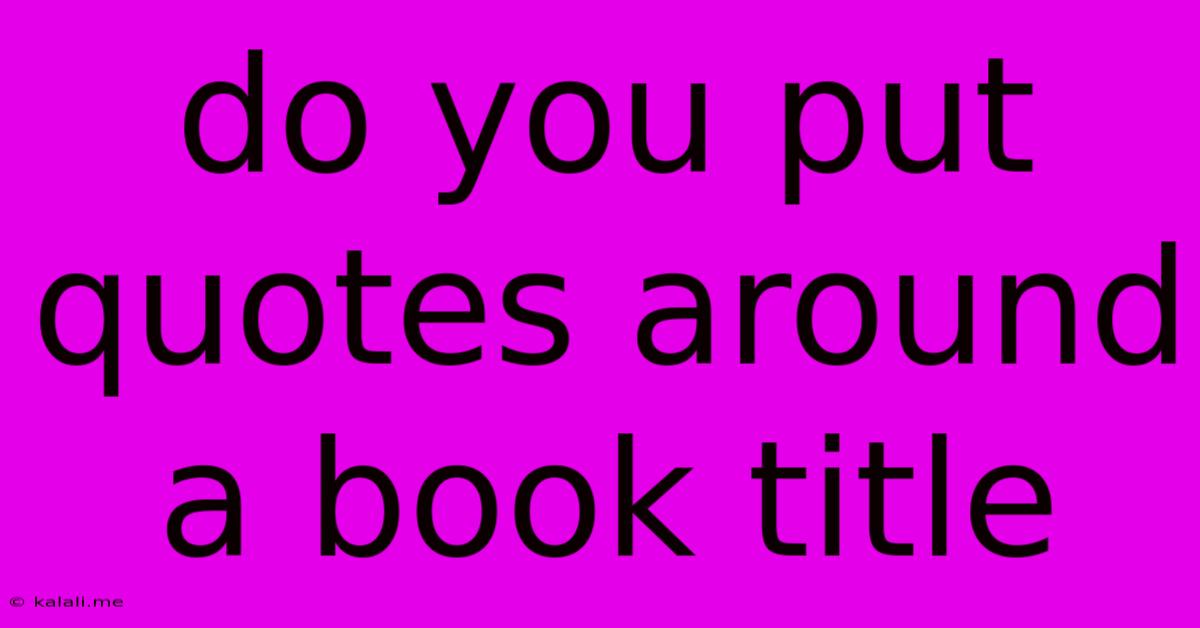Do You Put Quotes Around A Book Title
Kalali
Jun 10, 2025 · 3 min read

Table of Contents
Do You Put Quotes Around a Book Title? A Comprehensive Guide
When it comes to formatting book titles, the rules can seem a bit confusing. Do you italicize them? Use quotation marks? The answer depends on the style guide you're following and where the title appears. This guide will clarify the proper way to format book titles, eliminating any confusion. This post will cover different styles and help you choose the right method for your needs. Understanding this will improve your writing's professionalism and readability.
Understanding the Styles: MLA vs. APA vs. Chicago
There are several prominent style guides, each with its own conventions. The most commonly used are MLA (Modern Language Association), APA (American Psychological Association), and Chicago. They dictate different formatting styles for various aspects of academic writing, including book titles.
-
MLA: In MLA style, you italicize book titles. This applies whether you're mentioning the book in a sentence or creating a bibliography entry. For example: To Kill a Mockingbird is a classic novel.
-
APA: Similar to MLA, APA style also uses italics for book titles. This consistency simplifies the process for writers using this style. For example: The Great Gatsby explores themes of wealth and disillusionment.
-
Chicago: The Chicago Manual of Style also favors italics for book titles, mirroring the consistency seen in other major style guides. This ensures uniform formatting across different academic disciplines. For example: 1984 is a dystopian novel by George Orwell.
Exceptions and Clarifications
While italics are the standard for most style guides when citing a book's full title, there are exceptions:
-
Short Works within Larger Works: If you're referring to a short story or poem within an anthology, you would typically use quotation marks around the shorter work's title, while italicizing the anthology's title. For example: "The Lottery" is a short story found in the collection The Lottery and Other Stories.
-
Titles in Casual Writing: In informal writing (like blogs or social media posts), using quotation marks around a book title isn't necessarily incorrect, although italics remain the preferred and more formal approach. However, consistency is key. Choose a method and stick to it within a single piece of writing.
Choosing the Right Style for Your Context
The most important factor in determining whether or not to use quotation marks around a book title is the context. Are you writing an academic paper, a blog post, or a casual email?
-
Academic Papers and Formal Writing: Always prioritize the style guide specified by your institution or publication. MLA, APA, and Chicago style guides all recommend italicizing book titles.
-
Informal Writing: While italics are still preferred for clarity and professionalism, quotation marks are more acceptable in informal settings. However, maintain consistency throughout your writing.
-
Bibliography and Works Cited: Always adhere to the style guide's specifications when creating bibliographies or works cited pages. Using italics for book titles in these sections is crucial for proper academic citation.
Conclusion:
In short, for formal writing and academic papers, use italics for book titles. While quotation marks might appear in informal settings, consistency is paramount. Knowing the nuances of these formatting rules will improve your writing's precision and professionalism. By understanding and applying these style guidelines, you can ensure clear, consistent, and accurate presentation of book titles in your writing.
Latest Posts
Latest Posts
-
How Do You Save Seeds From A Tomato
Jun 11, 2025
-
Alles Gute Zum Geburtstag In English
Jun 11, 2025
-
Mobile Authenticator Is Not Activated 119 Csfloat
Jun 11, 2025
-
I Have Sometimes Hugged A Coworker At Work Application
Jun 11, 2025
-
What Is Your Name In Italian
Jun 11, 2025
Related Post
Thank you for visiting our website which covers about Do You Put Quotes Around A Book Title . We hope the information provided has been useful to you. Feel free to contact us if you have any questions or need further assistance. See you next time and don't miss to bookmark.